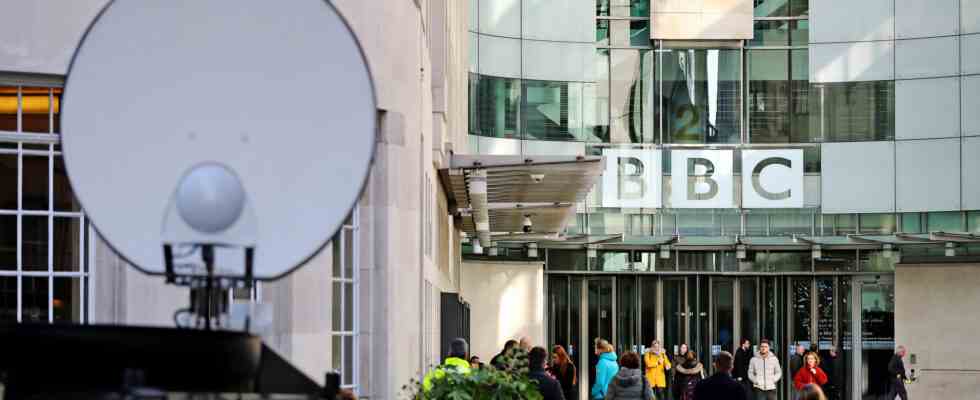Status: 08/30/2022 11:57 a.m
Former BBC presenter Maitlis has accused the station of self-censorship out of fear of the government. Impartiality and balance in reporting are not possible. The BBC rejects the allegations.
The trigger for the current debate are events from spring 2020. Dominic Cummings, who was then chief adviser to Prime Minister Boris Johnson, drove across the country in the middle of the lockdown – at a time when all citizens had to stay at home and not even family members deathbed could be accompanied. The outrage was great. Instead of sacking Cummings, Premier Johnson stuck with him.
Against this background, then-BBC presenter Emily Maitlis began the political magazine Newsnight with the words: “Good evening. Dominic Cummings has broken the rules. The country can see this and it is shocking that the government cannot.”
Maitlis spoke of the population feeling anger, contempt and anguish. Following this moderation, 10 Downing Street called the BBC and complained.
Conservative spokesman on the supervisory board?
That in itself is not uncommon, Maitlis made clear in a lecture. However, she finds it unusual that the BBC immediately tried to appease and within a few hours announced in a public apology that “Newsnight” had violated the principle of impartiality. Maitlis sees things differently to this day.
“We show our impartiality when we report without fear or goodwill. When we are not afraid to hold those in power accountable.”
Maitlis accuses the BBC of self-censoring out of fear of the government. She also believes that former Downing Street adviser Robbie Gibb, an active Conservative Party advocate, sits on the BBC’s board of directors and is now acting as the BBC’s arbiter of impartiality.
BBC is under enormous pressure
It is clear that the BBC is under enormous pressure. She enjoys little support in the conservative government and faces an uncertain future as the government wants to abolish broadcasting fees. However, the BBC has rejected Maitlis’ allegations. The broadcaster did not respond to the pressure from 10 Downing Street with its apology at the time and there was also no pressure from the board of directors, it is said.
“Deeper Truth Veiled”
The question that Maitlis wants to discuss is bigger than this single case anyway. She is concerned with what impartiality or balance in reporting actually means, how it can be implemented and how well – or not – the BBC succeeds in doing this.
Maitlis recalls the Brexit debate in 2016, when Great Britain began to discuss the big questions surrounding a possible exit from the EU. “A complicated subject. We tried to depict both sides of the debate,” says Maitlis. This intention was correct, but it was still done wrong.
“It took us maybe five minutes to find 60 economists who feared Brexit and five hours to find a single economist who supported the exit project,” she recalls. “But when we went on the air, we had a representative from each side.” This unequal relationship was presented as if it were balanced – but it wasn’t. “It achieves a superficial balance while obscuring a deeper truth.”
responsibility to put things in order
Maitlis gives another example that illustrates the responsibility of journalists to classify things. She mentions an interview with actor Robert De Niro during the corona pandemic. Maitlis wanted to talk to him about the precarious situation in New York, but De Niro was upset by the statement by US President Donald Trump, who found the idea of injecting disinfectant into citizens to fight Corona interesting.
“De Niro said to me, ‘It’s scary. Everyone is stunned by what Trump is doing. He’s a lunatic.’ – But my editor was teasing me and urged me to counteract it, i.e. to shed light on the other side,” says Maitlis. She didn’t – and explains:
“What’s the other side supposed to be? Should I say, ‘Nonsense, injecting disinfectant might work? We won’t know until we try it!’ Or should I pretend that Trump didn’t even talk about disinfectants? But there are recordings of that! Or should I say, ‘Well, you’re only saying that because you’re a liberal, left-wing Democrat!’?”
Star presenters are leaving the BBC
Maitlis not only gets applause in the public debate, but she is not alone in her criticism either. The fact is that other star presenters have left the BBC alongside Maitlis. And also from others, such as Andrew Marr, it can be heard that he wanted to be freer again in his presentations, freer in what he can say.
Is the BBC self-censoring out of fear of the government?
Imke Koehler, ARD London, August 30, 2022 10:28 a.m

